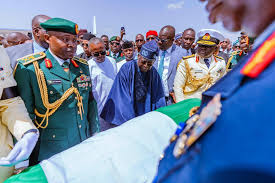The remains of former President Muhammadu Buhari have arrived at his residence in Daura, Katsina State, for his final burial, as hundreds of mourners gathered from dawn to pay their last respects to the former Nigerian leader.
Buhari’s body arrived at the Umaru Musa Yar’Adua International Airport in Katsina on Tuesday, accompanied by Vice President Kashim Shettima, President Bola Tinubu’s Chief of Staff Femi Gbajabiamila, and family members including his wife Aisha. President Tinubu personally received the remains at the airport, flanked by service chiefs and other top politicians.
The Nigerian military conducted a brief ceremony at the airport before the body was transported to Daura, where the former president will be laid to rest in his hometown. The solemn arrival marked the final chapter in the repatriation process that began with his death on Sunday at a London clinic.
The gathering of mourners, which began in the early hours of Tuesday, reflects the deep connection between the late president and his home state, where he maintained strong ties throughout his political career spanning from military leadership to democratic governance.
The presence of President Tinubu at the airport reception underscores the significance of the moment and the respect accorded to his predecessor. The ceremony brought together Nigeria’s current leadership with military officials and family members in a display of national unity during this period of mourning.
The former president’s homecoming represents the culmination of careful coordination between federal authorities and the Buhari family to ensure his final wishes were honored. The decision to bury him at his private residence in Daura, rather than at a public cemetery, reflects his deep attachment to his ancestral home.
Security arrangements have been extensive throughout Katsina State, with authorities working to manage the influx of dignitaries and mourners while maintaining order during the solemn proceedings. The scale of the gathering demonstrates the impact Buhari had on Nigeria’s political landscape over his decades of service.
As the nation prepares for the final burial ceremony in Daura, the focus remains on honoring the memory of a leader who served both as a military head of state and as a democratically elected president. The ceremony provides an opportunity for Nigerians to reflect on his contributions to the country’s development and democratic progress.
The burial ceremony is expected to proceed according to Islamic rites, with dignitaries from across Nigeria and beyond attending to pay their final respects to the late president who dedicated decades of his life to public service.



















